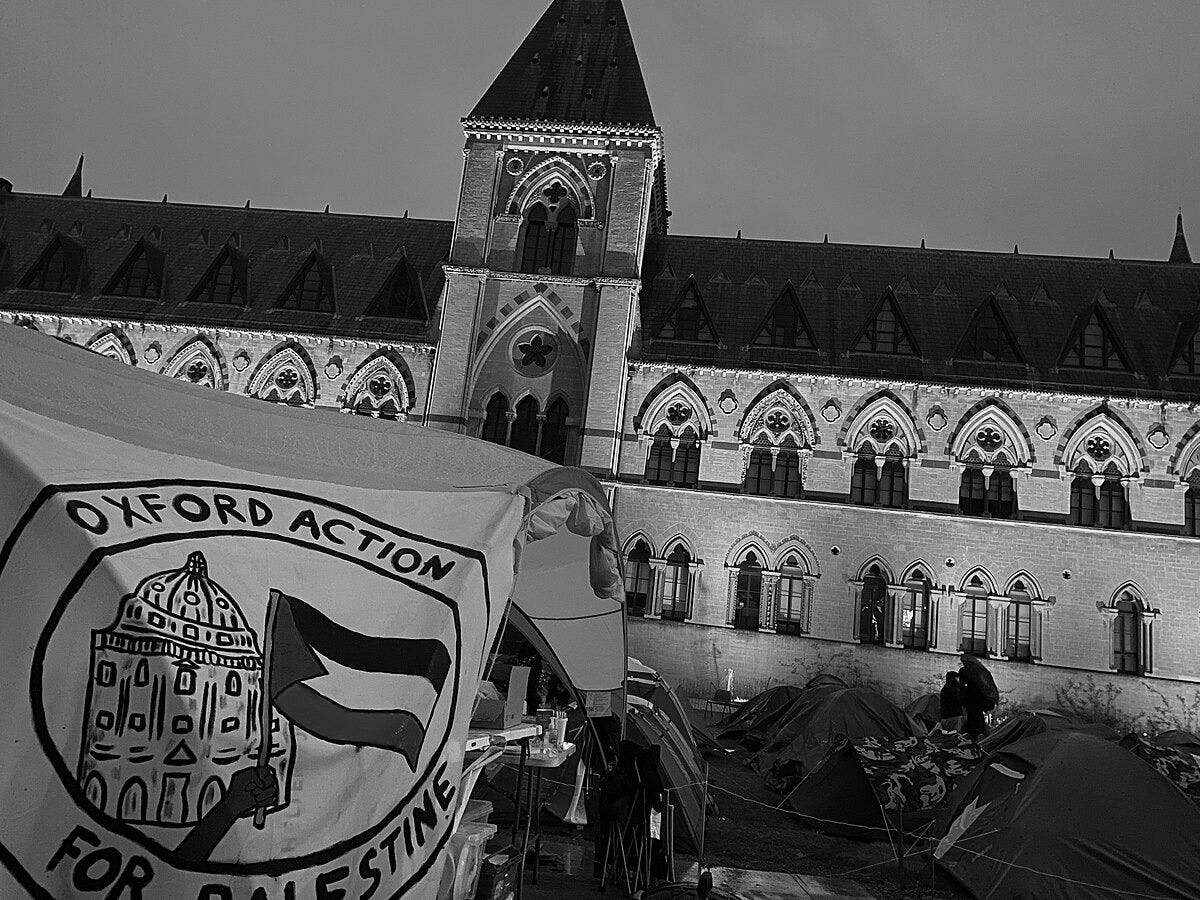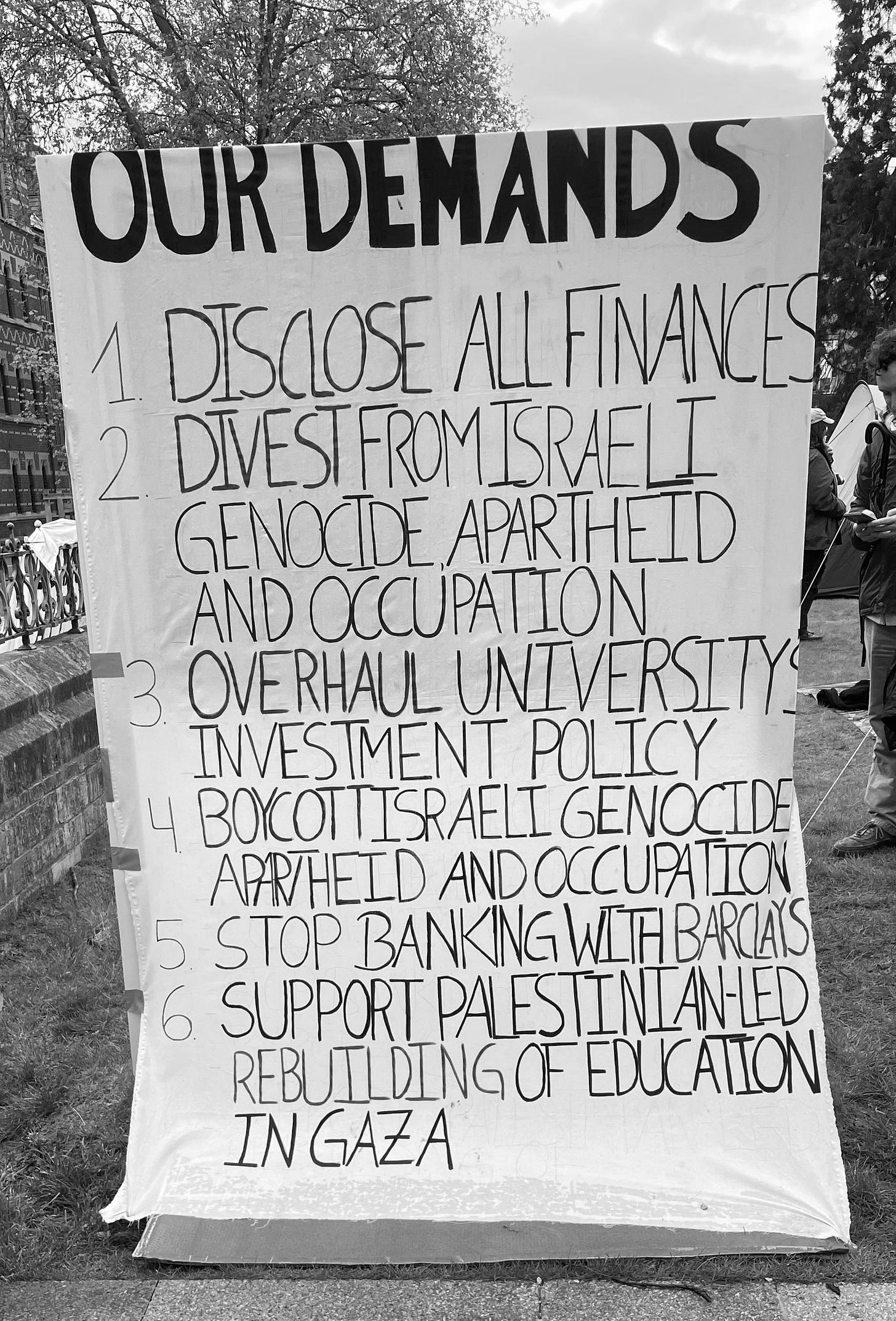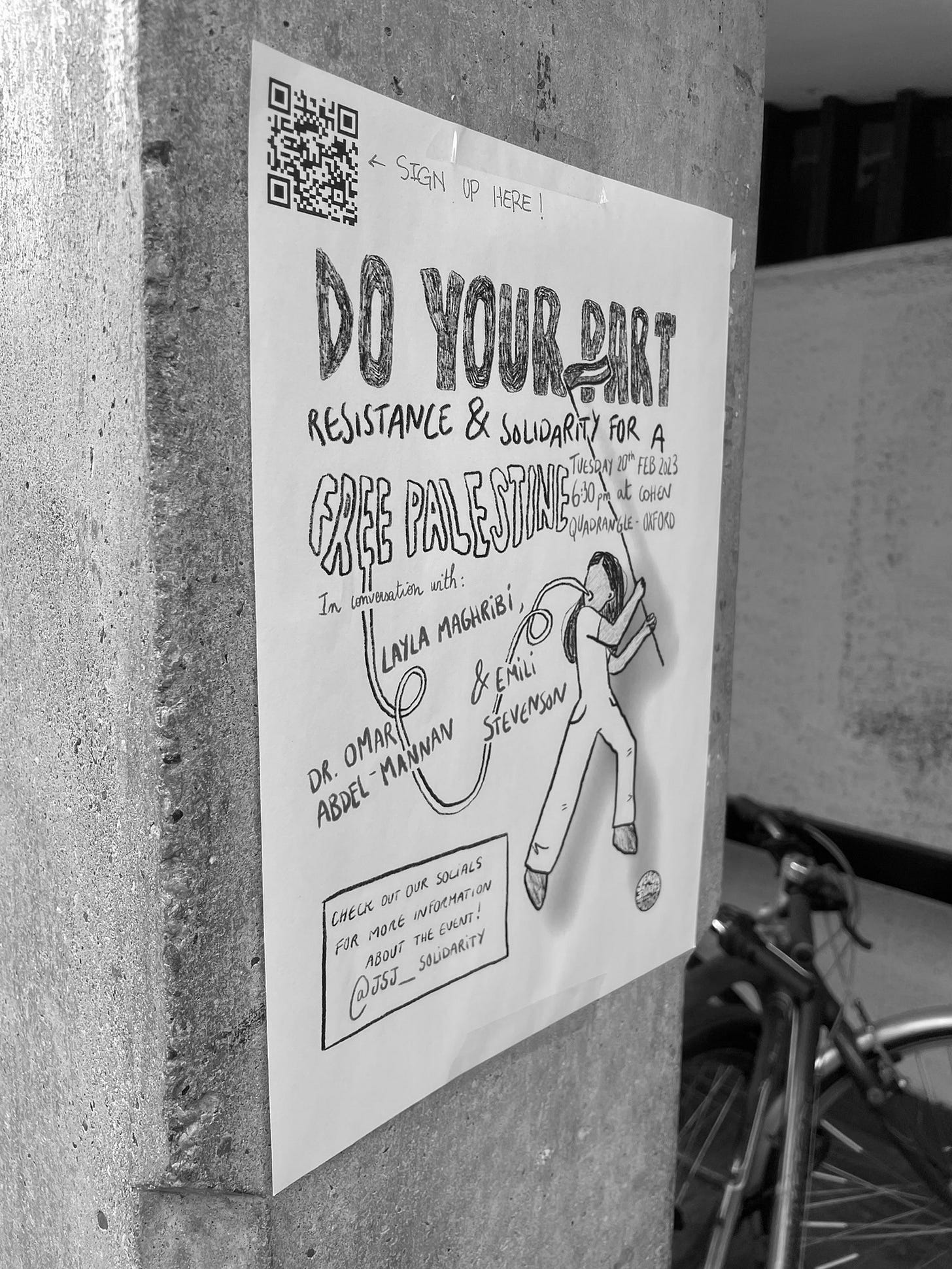The ‘Liberated Zone’ of ‘Oxford Action For Palestine’, May 2024.*
15th of January, 2024. Months before the encampments, months before Oxford Action for Palestine was even convened, I heard voices in the streets.
In my room, I ought to have been revising my papers, for finals. I ought to have been looking at third declension adjectives, Potidaea, Heidegger on technology. Instead, irresistibly, I was ingesting report after report about multi-lateral bombing in Southern Yemen, propaganda videos of ships being captured in the Red Sea, dispatches from Khan Younis and the West Bank, accounts of unlawful incarceration of Israeli’s by their own government, claims that Iran had bombed Kurdish civilians in Erbil, Mr Netanyahu’s Office declaring, “Nothing will stop us – not The Hague, not the axis of evil and not anybody else.” And with all this, invariably, an alarmingly neat, predictive, hideous division of the commentariat. The hordes of the same interpretations, ripping said reports apart, limb from limb, while they were still warm so to speak.
I could hear something from my window: “Hands off Gaza! Hands off Yemen!” I could just make it out. Down the stairs, out the door, take a left, cross the road: the University Administration Offices. There was a small gathering. No large banners, no stewards, no officiality. But their voices were carrying. The event seemed to be spontaneous, but earnest too. As I would come to learn, this was by design not coincidence.
Awkwardly, but with intention, I made my way up to the chanting group. I was taken by the event, and was self-conscious that I was doing something I felt needed to happen. All the same, I could feel my heart leaping. I felt even more self-conscious, performative even, when, having approached, I blurted out something about writing for a couple student journals and that I would be interested in recording any comments anyone had. Thankfully for my sake, a self-possessed member of this small coterie, ‘Miriam’, met my eye, and agreed to explain the demonstration:
It's a very grassroots movement that has been formed due to the oppression that we get given from other activists - us Arabs, and ethnic minorities, and black people. We find, like, we're not as welcome to express how we feel, especially in our languages as well. Although we make sure we try and stay. And we- The reason why we came to the offices today was because the UK and Israel and the USA attacked Yemen last week. It’s unlawful, and why did you do that in the first place? And if there are people trying to say that, ‘We don't want war,’ then why are you funding it and why is not anyone stepping up out of all political leaders saying, 'Enough! it's a genocide," because we clearly can see that. And South Africa has taken Israel to the I.C.J. court, which we are very proud of and happy with. But our hope is that this university, cause it's academic and has massive respect everywhere. And it likes to speak of like freedom and liberation and human rights - we want to see it come to effect. We want to see them say, like, it is a genocide, Israel is occupying Palestine, through the Balfour Declaration, and free Palestine, and Israel is a terrorist state through what it's doing and should be condemned for what they're doing. Also, we want the disappearance of political leaders that they still glorify till this day, people that - are people that - OK, they might have served some of this country, but they still- that doesn't mean they're good because they still – the erasure and the killing of our people back home, for example with Churchill.
Right, and are you students, or just based in Oxford?
Just based- I'm an Oxford local. I was a student, but I graduated.
Oh fair, and you're not affiliated with Palestinian Solidarity Campaign, for example? You're a separate group?
No, very independent group -
That was what my Voice Memos app picked up. I thanked ‘Miriam’, got her contact information and finally asked permission use her comments in a report which I would endeavour to publish in a student paper. I never succeeded in doing that.
I find the recording tough to listen, not because I regret having done the interview but more because of a disappointment in how it turned out. If I had been more confident and attentive, I could have delved deeper into ‘Miriam’s’ views: for example, what she had meant by demanding ‘the disappearance’ of political leaders, whether this was restricted to historical persons or not; how exactly she thought she had been ‘oppressed’ or ostracised from more mainstream protest movements; more broadly, what she made of the context of Houthi attacks on civilian shipping routes in the Red Sea. I was swept up in the moment, on the back foot. I was still too receptive and ingestive in my mood. Too caught up to realise that this was not just another ‘report’ I could sit back with and receive – it was an interview which I found myself conducting with a markedly enfranchised and forthright person.
Demands of ‘Oxford Action for Palestine’ listed in the ‘Liberated Zone’ outside the Pitt Rivers Museum.
The months between January and now effectively covers the expansion and (subsequent) deflation of so-called ‘pro-Palestinian’ student campaigns in Western universities. Throughout the ebb and flow of this movement came a deluge of suggestions about these student protestors being unserious. They were said to be in equal parts outrageous and impotent, hypocritical as they were misguided, zealous as they were insecure. Looking back, it strikes me that this type commentary did not seem to match-up with many facts. At the very least, it never served to capture that time well, and certainly not the 15th of January 2024 as I saw it. What I mean to say is that the impression which that modestly-sized group had on me, on that very day, was actually monumental and serious – not because I agreed with what they happened to be chanting (indeed, I found some of it contemptible), but rather because these individuals were an immediate and radical conduit. These protesters were in the process of permanently knitting up my immediate surroundings with the reports of Wars raging in the Middle East.
It is up for debate whether the group’s understanding of the issues reflected proper solidarity with the Palestinian and Yemeni people. But what is not a matter for debate is the fact that this group declared themselves undeniably and radically connected to what was happening over 2000 miles away. Commentators who wholeheartedly condescended to the protestors were just mollifying their own disgust at their purported aims. It was putting the cart before the horse. Whatever could be said about the protestors’ motives, one could never really argue that they were incidental. If ‘Miriam’ convinced me of anything at all that day, it was that she was purposeful. For her group (and, indirectly, myself), their actions are now irrevocably connected in the wider context of this War; their campaign was very really a part of this conflict which rages on in Israel, Gaza, Yemen, and so on.
I continue to reflect on these ideas about the protests, their significance, their connections, the specific impressions it made in me. I’ve had some conversations with friends about that time, not least about the period of protest which followed the above (inaugurated in the summer term by ‘Oxford Action For Palestine’). Before then, I certainly could never have predicted the consolidation and then the expansion of the student movement. Remembering January in comparison to May is astounding. The humble clique of independent protestors I recorded would multiply exponentially; by early summer, on the exact same spot at the Administration Offices, hundreds upon hundreds of students could be seen coordinating road-blocks, marches, occupations of buildings and land; their own University would soon be calling the Thames Valley Police to forcefully obstruct, arrest, and prosecute some of them.
A typical poster seen just before the peak of protest period. February 2024.
I witnessed this exhilarating situation first-hand, but again I still find that it’s the power of reflection which paints it in the most vivid colours. I mark the protests most strongly when I see them in the wider constellation of the War. This focus on ‘constellation’ or ‘connectiveness’ is not necessarily a feeling which my friends shared in at the time. During the acme of the protests, I remember visiting a vigil held outside the Pitt Rivers Museum for healthcare workers killed in Gaza. Before leaving, I bumped into a friend who also wrote for some student journals. I asked her if she was writing anything at the moment, and I recall her saying something along the lines of there being ‘more important things to do’, by which she meant focusing on aiding the campaign. The act of writing – which I believe is the most connective, aggregating action – was to be put on hold. Another friend I spoke to corroborated a feeling of utter displacement after witnessing the demonstrations in Oxford; in their immediacy, they were events which forced a radical reordering of his political priorities, not so much a matter of forming new connections. Of course, I also recall those more damning reflections on the protests’ affects: the ‘Oxford since 7/10’ group held the movement partly responsible for rising antisemitic incidents. The protests stupefied and perturbed, just as they animated and possessed.
My reaction – to record and write about the events – is not meant to be seen as privileged or liminal or special. More than pretentious, it would be wrong to say this. Nevertheless, I believe can refine what I think about my reaction slightly: I believe the overriding sense I had, whenever I honestly attuned myself to the protests, was that I had to feel as much of it as I could. I believe I failed at this, and I regret that I didn’t witness more, seek out better contacts, report at different stages of the movement’s degeneration. Even though I can pick apart my memories, discriminate my views on various facets of the protests – the chants, phrases, process and strategy, theories on intentions and effectiveness – despite all of these, the overriding feeling I synthesise is one of awe and entanglement. Crucially, this feeling could not have been accomplished without my seeking out the events as they immediately occurred.
A lesson I’ve taken from the protests is that, just as there is a connective power in reflection, tying up reports and accounts, so can there be a connective power in immediate actions (which themselves therefore deserve to be reported). There is a time for receiving ideas – and indeed, as I have said, this time can be most rewarding in concretising what has just occurred. But at the same time, there is another connective method which is immediate, spontaneous, stimulated. For an aspiring journalist, I think it taught me the importance of ‘reporting’ as opposed to ‘comment’. My brain was over-saturated with the latter. In commentary, connections between events are argued, manipulated, construed via reports, facts, assertions, and lies. Whereas, in seeking out the protests immediately, I could see connective power work itself out in real time. What remained was merely a duty to ‘report’ it thoroughly and honestly. I hope I have the courage to do this in the future.
*Image credits: Kiri of Karitane, 2024, Night photograph of the 2024 Oxford Palestine solidarity encampment 08. [Online]; San Francisco: Wikimedia Foundation.
Other images are my own.




